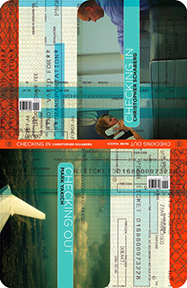I’m thinking to myself, what am I getting myself into here, folks? When was the last time I really got onto a plane? Surely it’s been over fifteen years now. And here I am flying alone this time around on a short flight from Sault Ste Marie to Toronto. Amelia where are you? I am drowning in the propeller drone of this Porter plane going skyward into this air streamed Amnesia.
What is this cotton candy? What is this ethereal stuff that makes us float up here? I am covered by these blankets mimicking clouds. Miles below is a dun-colour chess set, each piece, manoeuvring itself within the shifting landscape. Sometimes the mind gets the better of me. I can see ink splotches, maybe a dragon’s foot made of marshmallows playing with my tired mind set. On takeoff we hold our collective breaths in anticipation, the sun communicating to me alone through its silvery eye soldiering a hole in the clouds.
Those chess pieces come to life now, ready for the opening gambit: Beaches, enclaves of land, are built from the air like vast Lego structures laid out in skewed design. Nothing but eyeball quadrants, cubicles of color and lines bisecting space. Just when you thought it was one massive chunk of land, out of nowhere, like in a good ambush movie, a river runs through it.
I’ve only been airborne 40 minutes and already I can recognize some of the shapes down there. Lake Huron like a giant jagged jigsaw piece. Or a prehistoric tooth with achy outlines chiselled cold by aleotric Pre-Cambrian forces. Sometimes my eyes play tricks on me and I have to do a double take, imagining alphabets emerging from that vast carpet below. I can see the long H and long I of sky view now. Then the alphabet finally at rest recumbent in its splendour. The other portal on the opposite side offers up a felicitous west side exposure, the countryside charm of enhanced hydroglyphics.
Up to now, I’m really enjoying the meal, the view, and the idle banter with my seatmate. This flight was more of a fluke flight if truth be told. I had planned to take my family blueberry picking up in the Pre-Cambrian shield for a few weeks this summer. I took the trouble to buy myself a 1987 Ford Econoline, and converted it piece by piece into a workable camper. But alas, on our third week of picking it (the Econoline) died suddenly in a small mining town, necessitating my last-ditch effort to get home via air. My body is aching from the picking and trying desperately to resuscitate the Epic Beast (our camper’s name), but alas no dice. So now with a fine beer in hand and my sunburned arm resting on the vacant seat to my right’s armrest, it represents a peeling browned dermal lake. It is the perfect picture of a man’s skin in the time of Draught. The last legs of the Epic Beast.
The English riots are all up in the newspapers now. One witness saying they were like a video game that had kicked its way out of the X-box. What is to become of this Sceptred isle? This Royal throne of Kings, this late August? All the news talk now is of yobs and chavs and mob mentality rearing its head. The aisles here are awash with jittery passengers. A few rows up a snot faced child recites from the Panic alphabet putting the whole crew even further on edge. My decades flash by as if stuck in some bad airline dream.
On the final descent over mega Toronto we can see the endless miles of concrete octopi emerging from the convoluted dendrite layer of clouds. We bank right while the city sleeps in its complicated topography of glass and steel.
Finally, from the starboard side I can see the pinprick outlines of boats on Lake Ontario. As we land (safely), the airport’s long red weather sock trumpets out a hurray, hurray from its long prehistoric snout. Runway staffers waiting for us to de-plane stare in awe at the tarmac architecture of luggage like a group of idiot savants. But alas as I write this, I am home safe and sound thinking I should have spent more time in the complimentary peanut bar.
Denis Richard Robillard currently lives in Windsor, Ontario, where he works as a high school English teacher. Before this, in a long dark decade, he cut his literary teeth working various stints as probation officer, historical interpreter, pizza delivery man, and print journalist. Robillard's poems have appeared in more than 75 online and print sources.






